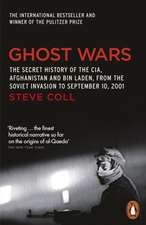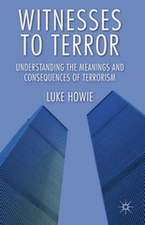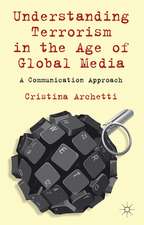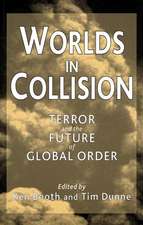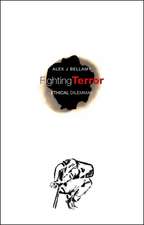States of Violence and the Civilising Process: On Criminology and State Crime: Critical Criminological Perspectives
Autor Rob Wattsen Limba Engleză Hardback – 17 iun 2016
This book offers a distinctive and novel approach to state-sponsored violence, one of the major problems facing humanity in the previous and now the twenty-first century. It addresses the question: how is it possible that large numbers of ordinary men and women are able to do the killing, torturing and violence that defines crimes against humanity? In his striking analysis, Rob Watts shows how and why states, of all political persuasions, engage in crimes against humanity, including: genocide, homicide, torture, kidnapping, illegal surveillance and detention.
This book advances a new interpretive frame. It argues against the ‘civilizing process’ model, showing how both states and social sciences like sociology and criminology have been complicit in splitting 'the social' from 'the ethical' while accepting too complacently that modern states are the exemplars of morality and rationality. The book makes the case that it is possible to bring together in the one interpretative frame, our understanding of social action involving personal motivation and ethical responsibility and patterns of collective social action operating in terms of the agencies of ‘the State’. Rob Watts identifies and charts the pathways of action and ‘practical’ (i.e. ethical) judgements which the perpetrators of these crimes against humanity constructed for themselves to make sense of what they were doing.
At once challenging and highly accessible, the book reveals the policy-making processes that produce state crime as well as showing how ordinary people do the state’s dirty work.
Din seria Critical Criminological Perspectives
-
 Preț: 324.62 lei
Preț: 324.62 lei - 20%
 Preț: 752.03 lei
Preț: 752.03 lei - 15%
 Preț: 640.06 lei
Preț: 640.06 lei - 18%
 Preț: 730.35 lei
Preț: 730.35 lei - 18%
 Preț: 1003.24 lei
Preț: 1003.24 lei -
 Preț: 391.61 lei
Preț: 391.61 lei -
 Preț: 388.72 lei
Preț: 388.72 lei - 15%
 Preț: 529.92 lei
Preț: 529.92 lei - 15%
 Preț: 641.85 lei
Preț: 641.85 lei - 15%
 Preț: 638.43 lei
Preț: 638.43 lei - 15%
 Preț: 690.44 lei
Preț: 690.44 lei -
 Preț: 398.74 lei
Preț: 398.74 lei - 15%
 Preț: 636.30 lei
Preț: 636.30 lei -
 Preț: 392.37 lei
Preț: 392.37 lei - 18%
 Preț: 725.75 lei
Preț: 725.75 lei -
 Preț: 384.70 lei
Preț: 384.70 lei - 18%
 Preț: 782.72 lei
Preț: 782.72 lei - 15%
 Preț: 642.51 lei
Preț: 642.51 lei - 18%
 Preț: 1007.03 lei
Preț: 1007.03 lei - 15%
 Preț: 527.32 lei
Preț: 527.32 lei -
 Preț: 446.26 lei
Preț: 446.26 lei - 18%
 Preț: 781.94 lei
Preț: 781.94 lei - 15%
 Preț: 469.22 lei
Preț: 469.22 lei - 15%
 Preț: 693.39 lei
Preț: 693.39 lei - 18%
 Preț: 1001.65 lei
Preț: 1001.65 lei - 18%
 Preț: 726.23 lei
Preț: 726.23 lei -
 Preț: 417.30 lei
Preț: 417.30 lei - 18%
 Preț: 781.62 lei
Preț: 781.62 lei -
 Preț: 212.06 lei
Preț: 212.06 lei -
 Preț: 394.51 lei
Preț: 394.51 lei - 15%
 Preț: 640.06 lei
Preț: 640.06 lei - 15%
 Preț: 640.88 lei
Preț: 640.88 lei -
 Preț: 416.71 lei
Preț: 416.71 lei - 18%
 Preț: 1111.22 lei
Preț: 1111.22 lei
Preț: 703.85 lei
Preț vechi: 828.05 lei
-15% Nou
Puncte Express: 1056
Preț estimativ în valută:
134.70€ • 146.26$ • 113.15£
134.70€ • 146.26$ • 113.15£
Carte tipărită la comandă
Livrare economică 22 aprilie-06 mai
Preluare comenzi: 021 569.72.76
Specificații
ISBN-13: 9781137499400
ISBN-10: 1137499400
Pagini: 411
Ilustrații: XII, 413 p.
Dimensiuni: 148 x 210 x 28 mm
Greutate: 0.61 kg
Ediția:1st ed. 2016
Editura: Palgrave Macmillan UK
Colecția Palgrave Macmillan
Seria Critical Criminological Perspectives
Locul publicării:London, United Kingdom
ISBN-10: 1137499400
Pagini: 411
Ilustrații: XII, 413 p.
Dimensiuni: 148 x 210 x 28 mm
Greutate: 0.61 kg
Ediția:1st ed. 2016
Editura: Palgrave Macmillan UK
Colecția Palgrave Macmillan
Seria Critical Criminological Perspectives
Locul publicării:London, United Kingdom
Cuprins
Introduction.- Chapter 1. Criminology and Crimes of the State.- Chapter 2. Thinking About Civilization, Violence and the State.- Chapter 3. Thinking the Unthinkable: The State and Crimes of the State.- Chapter 4. Stalin and Crimes of the State: The Soviet Terror, 1936-37.- Chapter 5. 'The Day the Police Came': Welfare Policy as State Crime.- Chapter 6. The United States of Exception: Crimes Of The State And The War On Terror, 2001-2015.- Chapter 7. Criminology, Society and the Ethical.- Chapter 8. Making Sense of Wickedness.- Chapter 9. Why Ordinary People Do Bad Things for the State.- Conclusion.
Notă biografică
Rob Watts is Professorof Social Policy at RMIT University, Australia. His previous publicationsinclude The Foundations of the National Welfare State (1987), ArguingAbout the Australian Welfare State (1992), Discovering Risk (2006), TalkingPolicy: Australian Social Policy (2007) and InternationalCriminology: A Critical Introduction (2009).
Textul de pe ultima copertă
This book offers a distinctive and novel approach to state-sponsored violence, one of the major problems facing humanity in the previous and now the twenty-first century. It addresses the question: how is it possible that large numbers of ordinary men and women are able to do the killing, torturing and violence that defines crimes against humanity? In his striking analysis, Rob Watts shows how and why states, of all political persuasions, engage in crimes against humanity, including: genocide, homicide, torture, kidnapping, illegal surveillance and detention.
At once challenging and highly accessible, the book reveals the policy-making processes that produce state crime as well as showing how ordinary people do the state’s dirty work.
Rob Watts is Professor of Social Policy at RMIT University, Australia. His previous publications include The Foundations of the National Welfare State (1987), Arguing About the Australian Welfare State (1992), Discovering Risk (2006), Talking Policy: Australian Social Policy (2007) and International Criminology: A Critical Introduction (2009).

